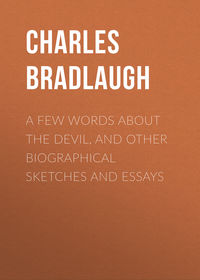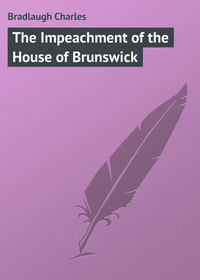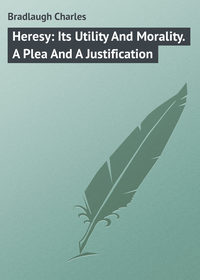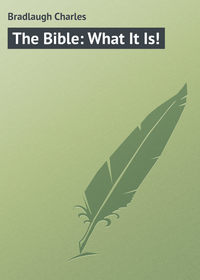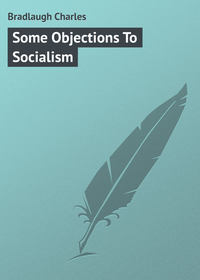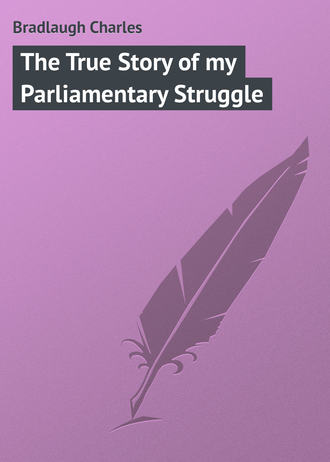 полная версия
полная версияThe True Story of my Parliamentary Struggle
Mr. Speaker, – I have again to ask the indulgence of the House while I submit to it a few words in favor of my claim to do that which the law requires me to do. Perhaps the House will pardon me if I supply an omission, I feel unintentionally made, on the part of the hon. member for Chatham in some words which have just fallen from him. I understood him to say that he would use a formal statement made by me to the Committee against what the Chancellor of the Duchy had said I had said. I am sure the hon. and learned member for Chatham, who has evidently read the proceedings of the Committee with care, would, if he had thought it fair, have stated to the House that the statement only came from me after an objection made by me – a positive objection on the ground that it related to matters outside this House, and that the House in the course of its history had never inquired into such matters; but I can hardly understand what the member for Chatham meant when he said that he contrasted what I did say with what the Chancellor of the Duchy said I said, for it is not a matter of memory, it is on the proceedings of this House, that being examined formally before the Committee, I stated: “That the essential part of the oath is in the fullest and most complete degree binding upon my honor and conscience, and that the repeating of the words of asseveration does not in the slightest degree weaken the binding of the allegiance on me.” I say now I would not go through any form – much as I value the right to sit in this House, much as I desire and believe that this House will accord me that right – that I did not mean to be binding upon me without mental reservation, without equivocation. I would go through no form unless it were fully and completely and thoroughly binding upon me as to what it expressed or promised. Mine has been no easy position for the last twelve months. I have been elected by the free votes of a free constituency. My return is untainted. There is no charge of bribery (cheers), no charge of corruption, nor of inducing men to come drunken to the polling booth. I come here with a pure untainted return – not won by accident. For thirteen long years have I fought for this right – through five contested elections, including this. It is now proposed to prevent me from fulfilling the duty my constituents have placed upon me. You have force – on my side is the law. The hon. and learned member for Plymouth spoke the truth when he said he did not ask the House to treat the matter as a question of law, but the constituencies ask me to treat it as a question of law. I, for them, ask you to treat it as a question of law. I could understand the feeling that seems to have been manifested were I some great and powerful personage. I could understand it had I a huge influence behind me. I am only one of the people, and you propose to teach them that on a mere technical question you will put a barrier in the way of my doing my duty which you have never put in the way of anyone else. The question is, has my return on the 9th of April, 1881, anything whatever to impeach it? There is no legal disqualification involved. If there were it could be raised by petition. The hon. member for Plymouth says the dignity of this House is in question. Do you mean that I can injure the dignity of this House? This House which has stood unrivalled for centuries? This House supreme among the assemblies of the world? This House, which represents the traditions of liberty? I should not have so libelled you. How is the dignity of this House to be hurt? If what happened before the 9th of April is less than a legal disqualification, it is a matter for the judgment of the constituency and not for you. The constituency has judged me; it has elected me. I stand here with no legal disqualification upon me. The right of the constituency to return me is an unimpeachable right. I know some gentlemen make light of constituencies; yet without the constituencies you are nothing. It is from them you derive your whole and sole authority. The hon. and learned member for Plymouth treats lightly the legal question. It is dangerous to make light of the law – dangerous because if you are only going to rely on your strength of force to override the law, you give a bad lesson to men whose morality you impeach as to what should be their duty if emergence ever came (hear, hear). Always outside the House I have advocated strenuous obedience to the law, and it is under that law that I claim my right. It is said by the right hon. baronet who interposes between me and my duty that this House has passed some resolution. First, I submit that that resolution does not affect the return of the 9th April. The conditions are entirely different, there is nothing since the date of that return. I submit next that if it did affect it the resolution was illegal from the beginning. In the words of George Grenville, spoken in this House in 1769, I say if your resolution goes in the teeth of the law – if against the statute – your resolution is null and void. No word have I uttered outside these walls which has been lacking in respect to the House. I believe the House will do me justice, and I ask it to look at what it is I claim. I claim to do that which the law says I must. Frankly, I would rather have affirmed. When I came to the table of the House I deemed that I had a legal right to do it. The courts have decided against me, and I am bound by their decision. I have the legal right to do what I propose to do. No resolution of yours can take away that legal right. You may act illegally and hinder me, and unfortunately I have no appeal against you. “Unfortunately” perhaps I should not say. Perhaps it is better that the Chamber which makes the law should never be in conflict with the courts which administer the laws that the Chamber makes. I think the word “unfortunately” was not the word I ought to have used in this argument. But the force that you invoke against the law to-day may to-morrow be used against you, and the use will be justified by your example. It is a fact that I have no remedy if you rely on your force. I can only be driven into a contest, wearying even to a strong man well supported, ruinous and killing to one man standing by himself – a contest in which if I succeed it will be injurious to you as well as to me. Injurious to me because I can only win by lessening your repute which I desire to maintain. The only court I have the power of appealing to is the court of public opinion, which I have no doubt in the end will do me justice. The hon. member for Plymouth said I had the manliness on a former occasion to make an avowal of opinions to this House. I did nothing of the kind. I have never, directly or indirectly, said one word about my opinions, and this House has no right to inquire what opinions I may hold outside its walls, the only right is that which the statute gives you; my opinions there is no right to inquire into. I shelter myself under the laws of my country. This is a political assembly, met to decide on the policy of the nation, and not on the religious opinions of the citizens (cheers). While I had the honor of occupying a seat in the House when questions were raised which touched upon religious matters, I abstained from uttering one word. I did not desire to say one word which might hurt the feelings of even the most tender (hear). But it is said, why not have taken the oath quietly? I did not take it then because I thought I had the right to do something else, and I have paid the penalty. I have been plunged in litigation fostered by men who had not the courage to put themselves forward (loud cheers below the gangway). I, a penniless man, should have been ruined if it had not been that the men in workshop, pit, and factory had enabled me to fight this battle (interruption). I am sorry that hon. members cannot have patience with one pleading as I plead here. It is no light stake, even if you put it on the lowest personal grounds, to risk the ambition of a life on such an issue. It is a right ambition to desire to take part in the councils of the nation, if you bring no store of wisdom with you, and can only learn from the great intellects that we have (hear, hear). What will you inquire into? The right hon. baronet would inquire into my opinions. Will you inquire into my conduct, or is it only my opinions you will try here? The hon. member for Plymouth frankly puts it opinions. If opinions, why not conduct? Why not examine into members’ conduct when they come to the table, and see if there be no members in whose way you can put a barrier? (Hear, hear.) Are members, whose conduct may be obnoxious, to vote my exclusion because to them my opinions are obnoxious? As to any obnoxious views supposed to be held by me, there is no duty imposed upon me to say a word. The right hon. baronet has said there has been no word of recantation. You have no right to ask me for any recantation. Since the 9th April you have no right to ask me for anything. If you have a legal disqualification, petition, lay it before the Judges. When you ask me to make a statement, you are guilty of impertinence to me, of treason to the traditions of this House, and of impeachment of the liberties of the people. My difficulty is that those who have made the most bitter attacks upon me only made them when I was not here to deal with them. One hon. and gallant member recently told his constituents that this would be made a party question, but that the Conservative members had not the courage to speak out against me. I should have thought, from reading “Hansard,” not that they wanted courage, but that they had cultivated a reticence that was more just. I wish to say a word or two on the attempt which has been made to put on the Government of the day complicity in my views. The Liberal party has never aided me in any way to this House. (Oh, from the Opposition.) Never. I have fought by myself. I have fought by my own hand. I have been hindered in every way that it was possible to hinder me, and it is only by the help of the people, by the pence of toilers in mine and factory, that I am here to-day, after these five struggles right through thirteen years. I have won my way with them, for I have won their hearts, and now I come to you. Will you send me back from here? Then how? You have the right, but it is the right of force, and not of law. When I am once seated on these benches, then I am under your jurisdiction. At present I am under the protection of the writ from those who sent me here. I do not want to quote what has happened before, but if there be one lesson which the House has recorded more solemnly than another, it is that there should be no interference with the judgment of a constituency in sending a man to this House against whom there is no statutory disqualification. Let me appeal to the generosity of the House as well as to its strength. It has traditions of liberty on both sides. I do not complain that members on that (the Conservative) side try to keep me out. They act according to their lights, and think my poor services may be injurious to them. (Cries of No.) Then why not let me in? (Cheers.) It must be either a political or a religious question. I must apologise to the House for trespassing upon its patience. I apologise because I know how generous in its listening it has been from the time of my first speech in it till now. But I ask you now, do not plunge with me into a struggle I would shun. The law gives me no remedy if the House decides against me. Do not mock at the constituencies. If you place yourselves above the law, you leave me no course save lawless agitation instead of reasonable pleading. It is easy to begin such a strife, but none knows how it would end. I have no court, no tribunal to appeal to; you have the strength of your votes at the moment. You think I am an obnoxious man, and that I have no one on my side. If that be so, then the more reason that this House, grand in the strength of its centuries of liberty, should have now that generosity in dealing with one who to-morrow may be forced into a struggle for public opinion against it (cheers).
Mr. Bradlaugh’s Third Speech at the Bar of the House of Commons, delivered February 7th, 1882Sir, – In addressing the House for the third time from this position, I feel the exceeding difficulty of dealing fairly with myself without dealing unfairly with the House. If I were to follow the hon. member who has just sat down into his errors of law, of history, and of memory, into his reckless misconceptions as to what are the views I hold and write about, I should only be giving pain to numbers of members here, and departing from that mandate with which my constituents have trusted me. It is – I say it with all respect – not true that I done anything more with reference to the succession than maintain the right of Parliament, meaning by Parliament both Houses, to control it; and any member who pretends that I done anything else, either does it, not having read what I have written, or heard what I have said, or having forgotten entirely what I have written or said, and being extremely careless in representing my views to the House. I regret that the hon. member should have imported into the discussion some fact supposed to have occurred in a police-court since I stood here before. I can only give the House my positive assurance that the hon. member is perfectly inaccurate in his representation of what took place. It is exceedingly painful to bandy words in this way. The hon. member was good enough to say he did not hear – he could not well have heard, for the magistrate did not refuse my affirmation at all. I happened to have been before Sir J. Ingham before, and he knew me, and knew the particular form of affirmation, and when the clerk read it to me no discussion took place on the subject. I hope the House will forgive me for contradicting such a small thing, but small things are sometimes much used. They have been used to work my ruin since I stood here before, and I regret that the shame of reticence did not at least keep it from this House, that the hon. member thought it his duty, by a common informer, to attempt to drive me into the Bankruptcy Court, and outside this House has boasted that the question would be solved in that way. It may be a brave boast, it may be consonant with piety from the hon. member’s point of view, but I believe that every other gentleman’s sense of piety would revolt against the notion of driving a single man into bankruptcy, and then canvassing for subscriptions – (hear, hear) – for the “bold and vigorous, and patriotic and noble conduct,” as the advertisement said, which consisted in hurrying in a cab to find the common informer to issue a writ against me. I dismiss that, however. I ask the House to pardon me for having wasted its time on this poor thing. I do not hope, I dare not think, that any word I may say here will win one vote; and I would have let this go silently against me, were it not that I owe a duty to the constituency that has twice entrusted me with its suffrages, a duty to every constituency right through the land in time to come – (hear, hear) – whose representative may be challenged as Northampton’s has been. (Hear, hear, and No.) Some gentlemen say “No,” but where is the challenge to stop? (Hear.) It is not simply theology, it is politics too (hear, hear). It is not simply theology that is brought before the House, but the wild imaginings of some member who, with the nightmare of panic upon him, and a wild imagining of the French Revolution clothed in terrors of which I know nothing, comes here to tell you of mighty Russia successful, and of the unfortunate United States with its Presidents assassinated because of religious and political opinions. Panic of that kind is not evidence as to my opinions. If this House intends to try me for my opinions, let it do it reasonably, and at least have the evidence before it. I would show you how unfair it is to trust to memory of words. The hon. member was good enough to tell the House that I had declared to a Committee of the House that certain words were meaningless. I hold in my hand the report of the Committee and the minutes of evidence, and no such words exist in any declaration of mine. (Hear, hear. Mr. Newdegate shook his head.) The hon. member does not believe me. I cannot make more than facts. I cannot make the comprehension which should distinguish when prejudice has determined that nothing shall be right that is put. The only way in which it can be pretended that anything of the kind in reference to the oath can be brought in is by taking my letter of the 20th of May, written outside the House, which does not contain a specific declaration the hon. member has put into it, which letter I protested ought not to be brought before the Committee at all, which I never volunteered to the Committee – (Opposition laughter) – which I objected to the Committee having before them. (Oh, and laughter from the Opposition.) The gentlemen who laugh, laugh because the laugh is the only answer that could be given. No reason can be given in reply, no facts can be quoted; and I ask hon. members who laugh to remember that I am pleading as though a quasi-criminal at this bar, and that I have a right to an audience from them, and I appeal to the House at least to give me a silent hearing. Judges do that. If you are unfit to be judges, then do not judge (hear, hear). It shows, at least, the difficulty of dealing with a question like this, when those who are to judge have come to a judgment already, not upon any facts, but upon what they think ought to be the facts. I ask the House to deal legally and fairly with me. Legally you are bound to deal; fairly, as an assembly of English gentlemen, you ought to deal with me, even if you have differences with me, even if you think my opinions so obnoxious, even if you think that the politics with which you identify me in your minds are dangerous to you (oh, oh). If I am not dangerous, why not let me speak there? (pointing to the seat he occupied last Session.) If there is no danger, why strain the law? If there is no danger, why disobey the law? It is put by the hon. gentleman who spoke last that there are certain words of the oath which the courts of law have declared essential, The courts of law have declared the exact opposite. So far as a decision has been given, the very report of the Committee shows that the highest court of judicature in this realm has decided the words are not essential to the oath at all. I ask the House to deal with me with some semblance and show of legality and fairness, and first I say that they ought not to go behind my election of the 9th of April, 1881, and that the House ought to reject the resolution moved by the right hon. gentleman, because it deals with matters which antedate my election, and because the House has nothing to do with me before the 9th of April, 1881. That is the return of which the Clerk at the table has the certificate. That is my only authority for being here. If I did aught before that rendered me unworthy to sit here, why did the House let me sit here from the 2nd of July to the 29th of March? If what I did entitles the House not to receive me, why has not the House had the courage of its opinions and vacated the seat? Either the seat is mine in law, and in law I claim it from you, or I am unworthy to hold it, and then why not vacate the seat and let the constituency express its opinion again? But my return is unimpeached, it is unimpeachable, and there has been no petition against me. The hon. member who went into back alleys for common informers could not find a petitioner to present a petition against it. If I speak with temper – (Opposition laughter) – the House, I trust, will pardon me. I have read within the last few days words spoken, not by members of no consequence, but by members occupying high position in this House, which make me wonder if this is the House of Commons to which I aspired so much. I have read that one right hon. member, the member for Whitehaven – (laughter from the Ministerial side) – was prompted to say to his constituents that I was kicked down stairs last Session, and that he hoped I should be again. If it were true that I was kicked downstairs I would ask members of the House of Commons on whom the shame, on whom the disgrace, on whom the stigma? I dare not apply this, but history will when I have mouldered, and you too, and our passions are quite gone. But it is not quite true that I was kicked downstairs, and it is a dangerous thing to say that I was, for it means that hon. members who should rely on law rely on force. It is a dangerous provocation to conflict to throw to the people. If I had been as wicked in my thought as some members are reported to have been in their speech, this quarrel, not of my provoking, would assume a future to make us all ashamed. I beg this House to believe, and I trust, Sir, that you at least will believe me, that I have tried as much as man might to keep the dignity of this House. I submitted last Session, and the Session before, to have had things said against me without one word of reply, because having had your good counsel, I felt it might provoke discussion upon matters which this House would willingly not have speech upon, and that I had far better rest under some slight stigma than occupy the House with my personality. I appeal to the recollection of every member of the House whether from the moment of my entering into it I did not utterly disregard everything that took place prior to my coming into it, and direct myself to the business for which my constituents sent me here. The most extraordinary statements are made as to my views, statements as inaccurate as those which have fallen, no doubt unconsciously, from the hon. member who has last addressed the House. One noble lord in a great London gathering convoked against me, a gathering which was not as successful as some that have taken place in my favor, denounced me as a Socialist. I do not happen to be one. I happen to think that Socialists are the most unwise and illogical people you can happen to meet. But the noble lord knew that I ought to be something (laughter). I am a red rag to a wild Conservative bull, and it must rush at me and call me Socialist. I ask this House to be more fair and just. If I am to be tried, at least let me be tried for the opinions I hold and the views I express. Why, there are members who have soiled their tongues with words about social relations and marriage for which I have no proper reply in this House, as unfortunately the forms of the House do not permit me to use the only fitting answer, and perhaps it is as well. But I ask the House, Do not let this be the kind of weapon with which a return is met. Deal with me as the law directs, and in no other way. It is said “You have brought this upon yourself” (hear, hear). One baronet who has spoken of me with a kindness more than I deserve, in the very borough which I represent said I had brought it upon myself, because when I originally came to the House I flaunted and most ostentatiously put my opinion upon the House (hear, hear). Well, not one word of that is true. Not a shadow of it is true. I hold in my hand the sworn evidence of Sir Erskine May. I do not ask gentlemen to take my word, for it is clear they will not, but that of their own officer. And when the right hon. baronet said I claimed under the statute, and drew an inference from it, he knows that my claim contained no such words until the clerk at the table of the House challenged me as to the law under which I claimed. I do not quarrel with him, but I submit that the Clerk of the House had no right to put that question to me. I submit that the House had nothing whatever to do with it – that it certainly is no ostentatious flaunting by me. I submit, that at any rate, that it is prior to the 9th of April, 1881, and the House had no right to revive it against me. I ask the House to try and deal with me with some show of fairness. They will find when I was before the Committee, instead of obtruding my opinions, I said I had never directly or indirectly obtruded upon the House any of my utterances or publications upon any subject whatever, and when pressed by one of the members sitting on that (the Opposition) side of the House as to certain opinions I was supposed to hold, by asking me particular words I was supposed to have used in a judicial proceeding, I said that if the Committee wished I would answer, but that I objected to answer, because I had carefully refrained from saying any word which would bring my opinions before the House. I ask, therefore, the House whether it is not monstrously unfair to say that I have obtruded any opinions here when I have expressly, carefully, and thoroughly kept them from the House? But it is said by the right hon. baronet that it would be a profanation to allow me to take the oath, and that the House would be no party to such a profanation (Opposition cheers). Does the House mean that it is a party to each oath taken? (hear.) There was a time when most clearly it was not so a party. There was a time when the oath was not even taken in the presence of members at all. But does the House mean it is a party now? Was it a party the Session before last? Was it a party when Mr. Hall walked up to that table, cheered by members on the other side who knew his seat was won by deliberate bribery? (loud Opposition cries of Order.) Bribery sought to be concealed by the most corrupt perjury. Did the House join in it? (renewed cries of Order.) If the House did not join in it, why did you cheer so that the words of the oath were drowned? But was the House a party when John Stuart Mill sat in this House? (hear, no.) A member who is, I think, now within the walls of the House – the hon. member for Greenwich – in addressing his constituents, said that Mr. Bradlaugh’s opinions were hardly more objectionable than those of some other members of the House. If the hon. member knew that, then he was a party to the profanation of the oath: but perhaps they were on his own side, and he did not feel the profanation so acutely (hear, hear, and laughter). But it is said, “Our real objection is that you have declared that the oath is not binding upon you” (hear, hear, from Mr. Alderman Fowler). That is exactly the opposite of what I did declare. The hon. member whose voice I hear now, I unfortunately heard on the 3rd of August; and heard so that I shall never forget it. (Mr. Bradlaugh here looked towards Alderman Fowler and paused.) The hon. member admits that is the point – that I have declared the oath is not binding upon my conscience; but, unfortunately, all the print goes the other way. I am asked by the Committee who sat as to whether the oath is binding, and on page 15 I reply: “Any form that I went through, any oath that I took, I shall regard as binding upon my conscience in the fullest degree, and I would go through no form and take no oath unless I meant it to be so binding.” Again, I am asked as to the word “swear.” I say: “I consider when I take an oath it is binding upon my honor and upon my conscience”; and with reference to the words of asseveration to which the hon. member for North Warwickshire referred, he would at least have been more generous towards myself, if generosity be possible with him, if he had said: “I desire to add – and I do this most solemnly and unreservedly – that the taking, and subscribing, and repeating these words of asseveration will in no degree weaken the binding effect of the oath upon my conscience.” I say here, Sir, before you, with all the solemnity man can command, that I know the words of the oath the statute requires me to take, that I am ready to take that oath according to law, and that I will not take an oath without intending it to be binding upon me, and that if I do take the oath it will be binding upon my honor and conscience. (Conservative cries of “Oh! oh!”) Members of the House who are ignorant of what is honor and conscience – (Loud cries of “Order,” “Oh, oh,” and “Withdraw,” from the Opposition.) If members will allow me to finish my sentence – (Cries of “Withdraw.”) Members of this House who are ignorant of what is – (Renewed cries from the Opposition of “Withdraw.”) These (Mr. Bradlaugh pointing to the Opposition benches) are my judges. Members of this House who are ignorant of what is the honor and conscience of the man who stands before them – (“Oh,” and laughter from the Opposition) – have a right to shout “Withdraw;” but they must beware lest a greater voice outside – (“Oh, oh,” and laughter from the Opposition) – at the ballot-box, where it has a right to express it, may not only say “withdraw,” but make withdraw all those who infringe the constitutional rights of the nation, as they seek to infringe them now. If I knew any kind of word which might convince members whom I desire to convince that I would take no pledge that I did not mean to be binding, I would use that form of words. But I have found myself so harshly judged, so unfairly dealt with, that one feels a difficulty in understanding whether any form of words, however often repeated, would convey any kind of conviction to some minds. I presume that this House will repeat its vote of April 26th. What then? Will it have the courage of its opinions, and vacate my seat? (Hear, hear.) If it does not, this House leaves me in an unfair position before the law. I am bound to come to this table, and will come to this table, as long as the mandate of my constituents sends me here, unless the House vacates the seat. If my seat be vacated, it is my duty to bow to the House, and appeal to my constituents again; and then the verdict rests with them. But to take away part of the right, and deal with it in this fashion, leaving me with the full legal responsibility and no kind of legal authority, I submit is not generous. Well, will this House repeat its vote of 9th May? Will it substitute force for law? At present the law is on my side (No, no, and hear, hear). If not, let me sit and sue me (hear, hear). If not, try by petition. If not, bring an action. But shouting “No” won’t decide the law, even with the united wisdom of the members of this House who shout it. I know that no man is a good advocate for a great principle unless he himself be worthy of the principle he advocates, and I have felt acutely the judgment properly passed upon me by many members of this House, who, knowing their superiority to me, say how unworthy I am that this question should be fought in my person. I admit I am unworthy, but it is not my fault that I have this fight to make. I remind you of the words of one of the greatest statesmen who sat in this House more than a hundred years ago, that whenever an infringement of the constitutional right was attempted, it was always attempted in the person of some obnoxious man (hear, hear). I ask the House for a moment to carry its mind to the 3rd of August last. I do that because either I do not understand what took place then, or my memory has failed me, as the memory of other hon. members sometimes does, or things happened without my consciousness. I thought I had stood aside until Parliament had dealt with the pressing business of the nation. I thought that had been recognised by this House. I thought I only came saying at the very door of the House that I was ready to obey its lawful orders, and I thought I was then seized by force while saying it. My memory may not serve me well on that, but I think it does. There were plenty of witnesses to the scene. I saw one hon. member climb on to a pedestal to see how fourteen men could struggle with one. It was hardly generous, hardly brave, hardly worthy of the great House of Commons, that those sending out to the whole world lessons of freedom, liberty, and law, should so infringe and so stamp them under foot. I had no remedy in any court, or I would have taken it. With all respect to you, Sir, and the officers of this House, if there had been any possibility of trying at law against the mighty privilege of this House, I would have appealed to that possibility. Let me now, before I finish, ask the ear of the House for one moment. It is said it is the oath and not the man; but others, more frank, say it is the man and not the oath. Is it the oath and not the man? I am ready to stand aside, say for four or five weeks, without coming to that table, if the House within that time, or within such time as its great needs might demand, would discuss whether an Affirmation Bill should pass or not. I want to obey the law, and I tell you how I might meet the House still further, if the House will pardon me for seeming to advise it. Hon. members have said that would be a Bradlaugh Relief Bill (hear, hear). Bradlaugh is more proud than you are (hear, hear). Let the Bill pass without applying to elections that have taken place previously, and I will undertake not to claim my seat, and when the Bill has passed I will apply for the Chiltern Hundreds (cheers.) I have no fear. If I am not fit for my constituents, they shall dismiss me, but you never shall. The grave alone shall make me yield (hear, hear, and “Oh”).


